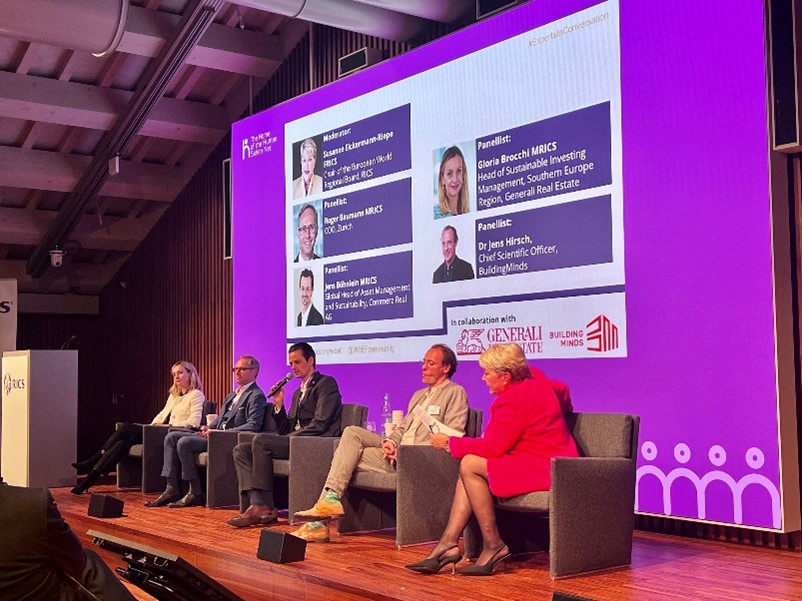How can real estate in Europe support the journey to net zero? With new regulations and standards in train to transform the European market, how are company and policy leaders in the region responding? In this article, Aaliyah Pollock, RICS Data and Tech Analyst shares some of the key takeaways from the WBEF Europe event.
The picturesque city of Venice, not only renowned for its intricate waterways and rich cultural heritage, but now as the ‘sustainability capital of the world’. Procuratie Vecchie, in the heart of Venice, held this year’s World Built Environment Forum (WBEF) Conference. The two-day event brought together industry leaders, experts and enthusiasts to discuss critical issues that are shaping the built environment sector.
The importance of ESG
Day one of the conference emphasised the need for decarbonisation in Europe's sustainable future. The forum highlighted the pivotal role of environmental, social, and governance (ESG) principles in navigating the complexities of the built environment. Speakers stressed the need for a comprehensive approach, integrating sustainability into investment practices and valuation methodologies.
A key takeaway was the importance of adapting to the evolving dynamics of the European market, this emphasised the crucial link between sustainable policies and long-term industry resilience. However, a stark reality emerged during the discussions, with the striking statistic from the European Commission's Renovation Wave Strategy that more than ‘85% of EU buildings are still expected to remain in 2050, while only 1% undergo sustainable renovation every year’.
Dominique Moerenhout, CEO of the European Public Real Estate Association, stated that ‘the elephant in the room is retrofitting existing stock’, underscoring the urgent need to address the challenge of sustainable renovation in the existing building infrastructure. This critical issue highlights the need to proactively prioritise sustainability in the development and renovation of buildings, allowing for a more resilient and environmentally conscious future for Europe.
“85% of EU buildings are still expected to remain in 2050, while only 1% undergo sustainable renovation every year.”

Photo: Susanne Eickermann-Riepe FRICS, Chair of the European World Regional Board, RICS, leads the panel discussion ‘Towards net zero: Analysing sustainability investment practices, ESG strategies, and beyond’.
The paradigm of circular economy
On day two of the event, the theme shifted toward Europe's readiness for a circular economy. Speakers discussed the imperative need for climate-resilient cities and infrastructure, highlighting the role they play in combating climate change. The approach of Venice, striving to lead as the World Capital of Sustainability, provided a tangible example of the fusion between traditional heritage and contemporary sustainability objectives. A crucial consensus emerged that changing user behaviour should precede significant investments in capital expenditure, highlighting the necessity of encouraging sustainable habits in communities before committing to large-scale infrastructure projects. This principle resonated profoundly, as it shows the significance of a bottom-up approach in working towards a culture of sustainability.
During the session ‘Climate resilient cities and infrastructure: Venice’s vision for the future’, insights were shared about MOSE, Venice's sea defence system. MOSE has served as a prime illustration of the city's proactive measures to protect its ports, city and lagoon from the escalating threats posed by climate change. This innovative strategy highlighted the significance of implementing adaptive solutions that not only safeguard critical infrastructure, but also preserve the cultural heritage embedded within the city's identity.
On day two, we also learned that cities play a vital role in steering social progress, highlighting the crucial need for well-defined development plans. This recognition underscored the significance of sustainable urban planning in cultivating communities that not only flourish economically but also prioritise environmental preservation and fair social practices. This sets the foundation for a more inclusive and environmentally-aware tomorrow.
Harnessing the power of data
The theme of data was reiterated across various sessions, emphasising the need to address key questions such as:
- How do we improve the quality of data?
- How can we standardise data?
- How do we make data more transparent?
- How can key stakeholders collaborate with this data?
Most, if not all the discussions, stressed the important role of data in steering sustainable initiatives and driving informed decision making. It became apparent that data is often prioritised in situations that promise rapid and substantial profits. Notably, Roger Baumann MRICS, COO, Zurich, who’s insight ‘we need to bring non-financial data to the same level as financial data’, stressed the significance of elevating the status of ESG data. We also heard from Luca Bertalot, Secretary General of the EMF-ECBC, and his thoughts around data standardisation that ‘we need to build international standards to reduce capital’. If the improvement of data quality is indeed the crux of the issue, it is imperative to initiate necessary steps towards this enhancement.
“We need to bring non-financial data to the same level as financial data.”
Roger Baumann, MRICS
COO, Zurich
Pledging to a sustainable future
The overarching message of the conference was one of collective responsibility and commitment to building a sustainable future. The urgency to tackle the challenges posed by climate change and urbanisation resonated deeply with all those who attended. The call for integrating sustainable practices into every aspect of the built environment was resoundingly clear, underlining the necessity for a unified approach to drive meaningful and long-lasting change.
The event encouraged important conversations and paved the way for an inclusive future for the built and natural environment, highlighting the importance of collaboration, innovation and collective action in shaping a sustainable future.
The commitment to advancing sustainability resonates across domains within the built environment. The insights gathered during WBEF Europe will continue to guide stakeholders, urging them to embrace sustainability as the linchpin for growth and success in the sector.
World Built Environment Forum Week 2024
Accelerating decarbonisation across the land and building lifecycle
Returning for its seventh year, the World Built Environment Forum’s annual global gathering, WBEF Week, will enable participants to engage in critical discussions about the direction of the built and natural environment with the people who are shaping it around the world.



